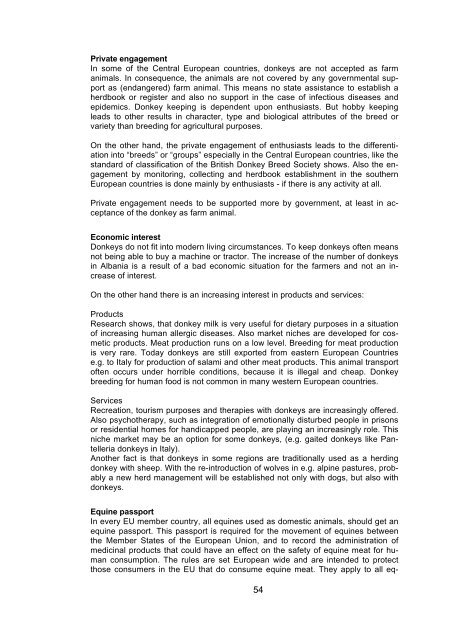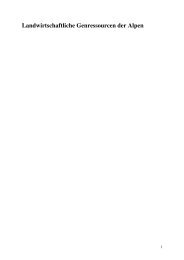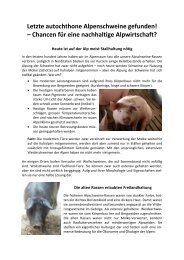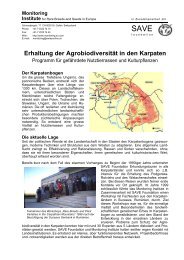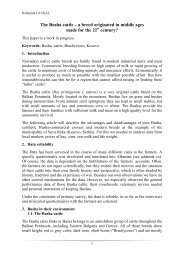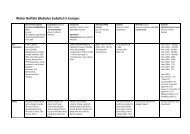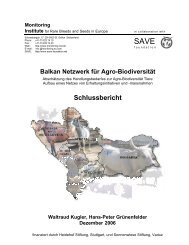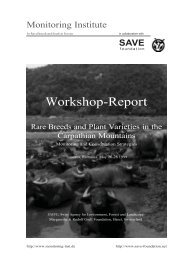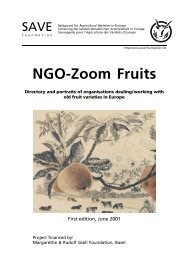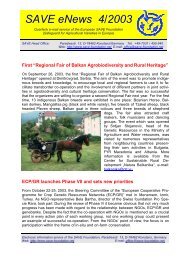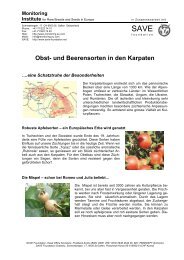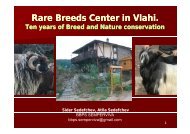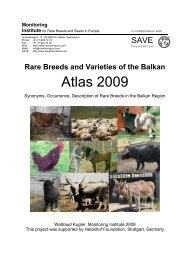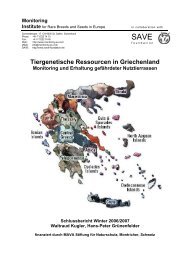Donkey Breeds in Europe - Safeguard for Agricultural Varieties in ...
Donkey Breeds in Europe - Safeguard for Agricultural Varieties in ...
Donkey Breeds in Europe - Safeguard for Agricultural Varieties in ...
You also want an ePaper? Increase the reach of your titles
YUMPU automatically turns print PDFs into web optimized ePapers that Google loves.
Private engagement<br />
In some of the Central <strong>Europe</strong>an countries, donkeys are not accepted as farm<br />
animals. In consequence, the animals are not covered by any governmental support<br />
as (endangered) farm animal. This means no state assistance to establish a<br />
herdbook or register and also no support <strong>in</strong> the case of <strong>in</strong>fectious diseases and<br />
epidemics. <strong>Donkey</strong> keep<strong>in</strong>g is dependent upon enthusiasts. But hobby keep<strong>in</strong>g<br />
leads to other results <strong>in</strong> character, type and biological attributes of the breed or<br />
variety than breed<strong>in</strong>g <strong>for</strong> agricultural purposes.<br />
On the other hand, the private engagement of enthusiasts leads to the differentiation<br />
<strong>in</strong>to “breeds” or “groups” especially <strong>in</strong> the Central <strong>Europe</strong>an countries, like the<br />
standard of classification of the British <strong>Donkey</strong> Breed Society shows. Also the engagement<br />
by monitor<strong>in</strong>g, collect<strong>in</strong>g and herdbook establishment <strong>in</strong> the southern<br />
<strong>Europe</strong>an countries is done ma<strong>in</strong>ly by enthusiasts - if there is any activity at all.<br />
Private engagement needs to be supported more by government, at least <strong>in</strong> acceptance<br />
of the donkey as farm animal.<br />
Economic <strong>in</strong>terest<br />
<strong>Donkey</strong>s do not fit <strong>in</strong>to modern liv<strong>in</strong>g circumstances. To keep donkeys often means<br />
not be<strong>in</strong>g able to buy a mach<strong>in</strong>e or tractor. The <strong>in</strong>crease of the number of donkeys<br />
<strong>in</strong> Albania is a result of a bad economic situation <strong>for</strong> the farmers and not an <strong>in</strong>crease<br />
of <strong>in</strong>terest.<br />
On the other hand there is an <strong>in</strong>creas<strong>in</strong>g <strong>in</strong>terest <strong>in</strong> products and services:<br />
Products<br />
Research shows, that donkey milk is very useful <strong>for</strong> dietary purposes <strong>in</strong> a situation<br />
of <strong>in</strong>creas<strong>in</strong>g human allergic diseases. Also market niches are developed <strong>for</strong> cosmetic<br />
products. Meat production runs on a low level. Breed<strong>in</strong>g <strong>for</strong> meat production<br />
is very rare. Today donkeys are still exported from eastern <strong>Europe</strong>an Countries<br />
e.g. to Italy <strong>for</strong> production of salami and other meat products. This animal transport<br />
often occurs under horrible conditions, because it is illegal and cheap. <strong>Donkey</strong><br />
breed<strong>in</strong>g <strong>for</strong> human food is not common <strong>in</strong> many western <strong>Europe</strong>an countries.<br />
Services<br />
Recreation, tourism purposes and therapies with donkeys are <strong>in</strong>creas<strong>in</strong>gly offered.<br />
Also psychotherapy, such as <strong>in</strong>tegration of emotionally disturbed people <strong>in</strong> prisons<br />
or residential homes <strong>for</strong> handicapped people, are play<strong>in</strong>g an <strong>in</strong>creas<strong>in</strong>gly role. This<br />
niche market may be an option <strong>for</strong> some donkeys, (e.g. gaited donkeys like Pantelleria<br />
donkeys <strong>in</strong> Italy).<br />
Another fact is that donkeys <strong>in</strong> some regions are traditionally used as a herd<strong>in</strong>g<br />
donkey with sheep. With the re-<strong>in</strong>troduction of wolves <strong>in</strong> e.g. alp<strong>in</strong>e pastures, probably<br />
a new herd management will be established not only with dogs, but also with<br />
donkeys.<br />
Equ<strong>in</strong>e passport<br />
In every EU member country, all equ<strong>in</strong>es used as domestic animals, should get an<br />
equ<strong>in</strong>e passport. This passport is required <strong>for</strong> the movement of equ<strong>in</strong>es between<br />
the Member States of the <strong>Europe</strong>an Union, and to record the adm<strong>in</strong>istration of<br />
medic<strong>in</strong>al products that could have an effect on the safety of equ<strong>in</strong>e meat <strong>for</strong> human<br />
consumption. The rules are set <strong>Europe</strong>an wide and are <strong>in</strong>tended to protect<br />
those consumers <strong>in</strong> the EU that do consume equ<strong>in</strong>e meat. They apply to all eq-<br />
54


